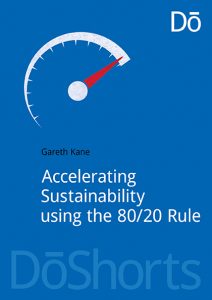The 80:20 rule and delivering Net Zero: how my thinking has evolved in the last decade
 Many moons ago, I wrote a short book ‘Accelerating Sustainability using the 80:20 rule‘. I’m sure anybody reading this will know broadly what the 80:20 rule/Pareto principle is – the statistical phenomenon that, in many systems, 20% of input delivers 80% of outcomes, and vice versa. My thesis in the book was that most ‘standard practice’ in sustainability falls into the ‘trivial many’ ie the 80% of actions that deliver 20% of outcomes: ISO14001, reporting (I have clients whose teams spend 50+% of their measuring progress rather than doing the stuff that actually delivers progress), appointing Sustainability champions etc. If we identify and focus our energies on the 20% ‘vital few’ actions, then we will move much more quickly.
Many moons ago, I wrote a short book ‘Accelerating Sustainability using the 80:20 rule‘. I’m sure anybody reading this will know broadly what the 80:20 rule/Pareto principle is – the statistical phenomenon that, in many systems, 20% of input delivers 80% of outcomes, and vice versa. My thesis in the book was that most ‘standard practice’ in sustainability falls into the ‘trivial many’ ie the 80% of actions that deliver 20% of outcomes: ISO14001, reporting (I have clients whose teams spend 50+% of their measuring progress rather than doing the stuff that actually delivers progress), appointing Sustainability champions etc. If we identify and focus our energies on the 20% ‘vital few’ actions, then we will move much more quickly.
It struck me last week that if I was to publish a second, updated edition of the book, I would add the following:
1. Costs: According to many commentators, decarbonising the economy by 80% or even 90% is much, much cheaper than 100%. So instead of getting hung up on absolute zero emissions, we should be getting on with decarbonising what we can at pace without crashing the economy, which takes us on to…
2. The area under the curve matters: in theory, we could cruise up to 2050 under business as usual and then suddenly decarbonise all at once using a magic-wand type technology (sounds ridiculous, and it is, but a surprising number of supposedly intelligent people actually want us to put our faith in such a techno-miracle). However the world would still be hit by terrible warming due to all the greenhouse gases accumulating in the atmosphere in the meantime, ie the area under the curve of emissions verses time is the important bit. The 2050 target assumes we will try to minimise that area by cutting emissions swiftly and 80:20 thinking helps get that going ASAP.
3. The book was written before Net Zero was a thing, so I would add at least a chapter on what Net Zero means in the context of 80:20. The emerging definition of Net Zero is 80-90% cuts in carbon emissions and 10-20% carbon removals. I’m currently pondering whether 90:10 is really a ‘better’ target than 80:20, as the latter may be an order of magnitude more feasible in practice. It would certainly be infinitely better to achieve 80% than strive for 90% and get completely stymied by social, economic and/or political storms.
In summary, 80:20 isn’t just a way to accelerate progress, it might actually make the business of diverting the worst of climate change much more feasible by reining in our ambition just a little.


1 Comment
Leave your reply.